Category — Features
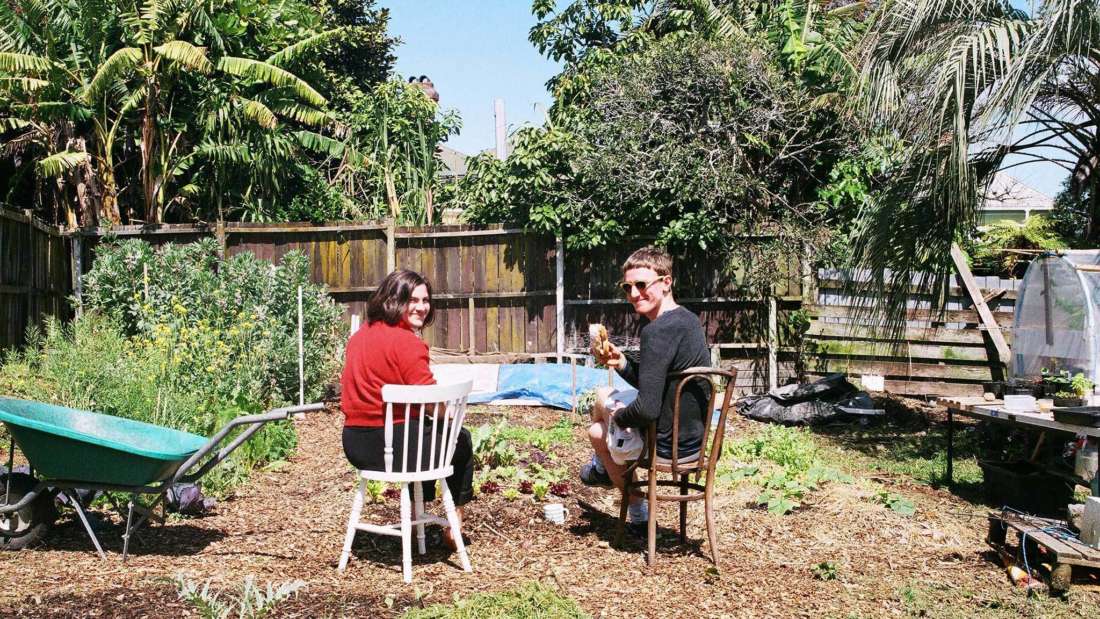
Urban abundance
Growing the future with Ella Rose Shnapp and Levi Brinsdon-Hall
In March 2017, just around the corner from Ripe delicatessen in Grey Lynn, we moved into an old villa that looked like it hadn’t changed since the fifties. All that was present in the yard was a large lawn space reminiscent of a public park and a quintessential backyard shed. The section is under a quarter acre in size and borders on seven other properties. Some have said a visit here is like a trip back in time.
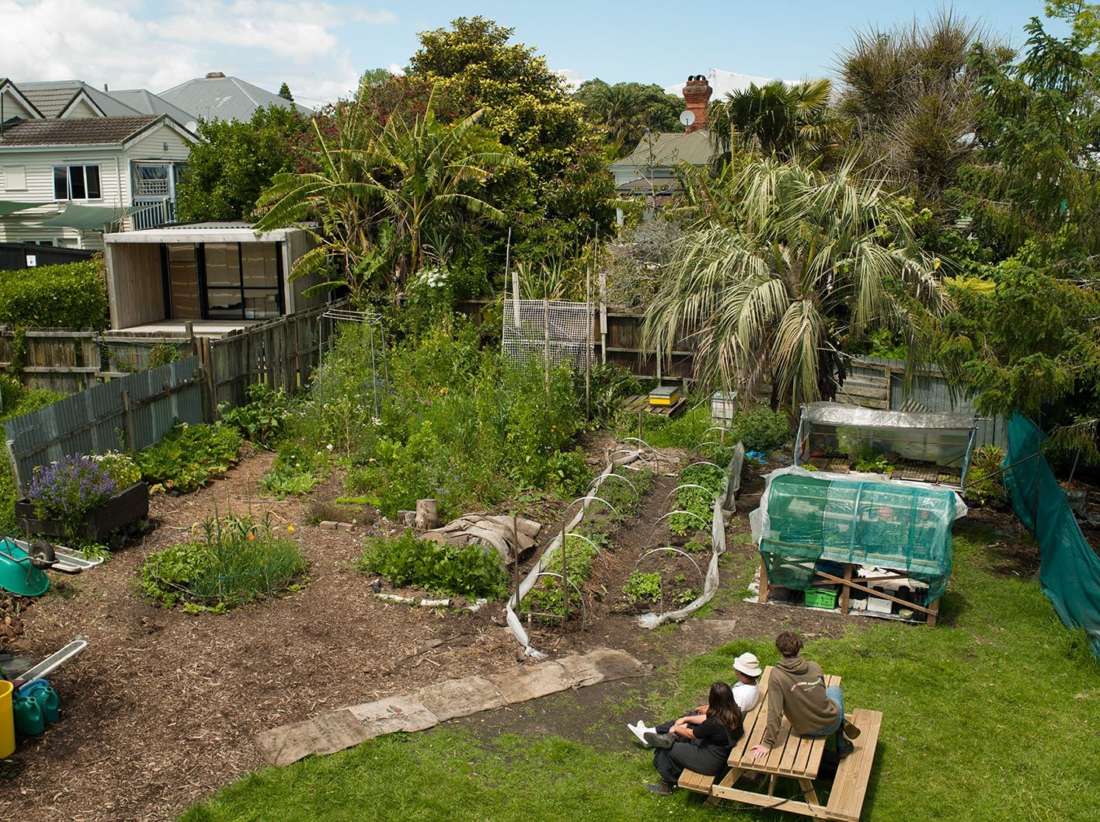
In the space of eighteen months, we have radically transformed the lawn from a passive and empty green space into an ecologically abundant garden, rich in diversity; food, flowers and all kinds of life. The land is now busy with nine large garden beds totaling approximately 200m² of growing space, multiple composting systems, polytunnels, hand built greenhouses, beehives, chickens, worm farms, homemade fertilisers, native plantings and a berm bursting with 67 giant heirloom sunflowers, part of a living work of art that Levi is creating. The once bare lawn is now an organic pollinator sanctuary and a plentiful source of nutritious and delicious, organic food.
We have done all of this whilst working mostly full time, the garden becoming part of our daily routine. When asked how we manage to make time to do this work, the answer we give is that it doesn’t feel like work, it’s just life. It’s what humans have done to evolve. Our garden is an ever-evolving space, a constant source of inspiration, a place of peace, protest, community and more. First and foremost, the garden is our creative playground, wild and abundant. We have learnt more from our practice here than from anything else. It has enabled us to experiment with different growing methods and garden designs, and through this process we demonstrate what is possible right in the heart of New Zealand’s largest city.
The real magic happens when someone new visits and it stops them in their tracks. We have seen this happen to so many people. Their eyes light up and their body language changes as they absorb the shapes, colours and vibrations of the space. Since we’ve grown this garden, around thirty of our friends, workmates and even complete strangers have told us that they’ve been inspired to start growing because of us. Our garden created a community and the community created their own gardens. For us, this is the greatest transformation and also the greatest reward. Creating such a garden is in itself a model for change. Like happiness, these nature filled spaces amplify a captivating ‘love energy’ that works on a subliminal and deeply primitive level to transform our self-efficacy and make us feel calm, content, inspired and one with nature.
Nature is inherently generous, and so are we.
Creating biologically bountiful and fertile soils, and growing in a way that maintains this fertility over time, is the number one task of any organic grower. The more life there is in the soil, the more food there is for the soil microbes to eat, the more minerals and nutrients are made available to feed the plants, the stronger and more resilient they are, and ultimately, the healthier we become from eating them.
We do our best to learn from nature and design our system to function as a closed loop where there is no such thing as ‘waste’, only opportunity. When we catch fish, we eat it alongside veggies from the garden. The heads are made into soup, the bones boiled down to create stock for another meal and the remains are put into the bokashi bin to make fertiliser. Our vegetable scraps and garden weeds are fed to the chickens who produce eggs and manure, or to the worms, who produce vermicast and ‘worm tea’ liquid fertiliser. When fed to the soil, these fertilisers provide food for microbes and build the humus content in the soil. The humus and microbes feed and strengthen the plants, helping them grow nutrient-dense flowers that feed our resident honey bees. These bees then diligently produce honey and wax, some of which Ella Rose uses to make and sell candles and balms. And so the cycle continues. The most beautiful, and perhaps the most rewarding thing, is that when you start this practice of giving, the system you create will only keep giving back to you.
But when you start an organic garden, it is not only the plants that you are growing, you are growing a whole ecosystem of interrelations. The ‘pollinator patch’ is a 7m² growing bed that is specifically planted and maintained to provide food and habitat for pollinators. The soil is never tilled so as not to disturb native bee or bumblebee nests and there is always a bounty of flowers that function to feed urban pollinators and attract beneficial insects. Furthermore, they are cooling and cleaning the air and sequestering carbon. Since moving in, we have observed a substantial increase in the numbers of native birds. Flocks of tauhou (silvereye) and kōtare (kingfisher) come to eat bugs, gorging on the increased cricket and worm populations. We have also seen rūrū (owl), tui and kererū visit in greater numbers. Witnessing this land feeding the wider ecosystem has been deeply rewarding. It has planted seeds for the return of an urban dawn chorus.
We both firmly believe that you don’t need lots of time or money to have a bountiful vegetable garden. Our capitalist economy is geared towards producing excess and we have found, if you are prepared to search for it and make new friends, there are inexhaustible ‘waste’ resources to be repurposed into fertility. A local arborist delivers wood chips to us free of charge because he has to pay to get rid of them otherwise. We have also built a relationship with a commercial shiitake mushroom farm that allows us to take their waste spawn, made from inoculated oak shavings, an incredible compost ingredient. We have collected horse manure from farmers in Ranui and raided supermarket vegetable bins for our worm farm. Seek and you shall find. Even in the natural environs of the city there is an excess of leaves that fall off trees in autumn (that the council pays to clean up); infinite grass clippings from parklands we deem necessary to mow; seaweed that washes up on northern beaches after a storm (that Takapuna locals complain about); and invasive bamboo growing in public parks that make great garden stakes. The beautiful thing about gathering such resource is the relationships you build with people throughout the journey. Most of the time, people are absolutely stoked that you are transforming their problem into something useful.
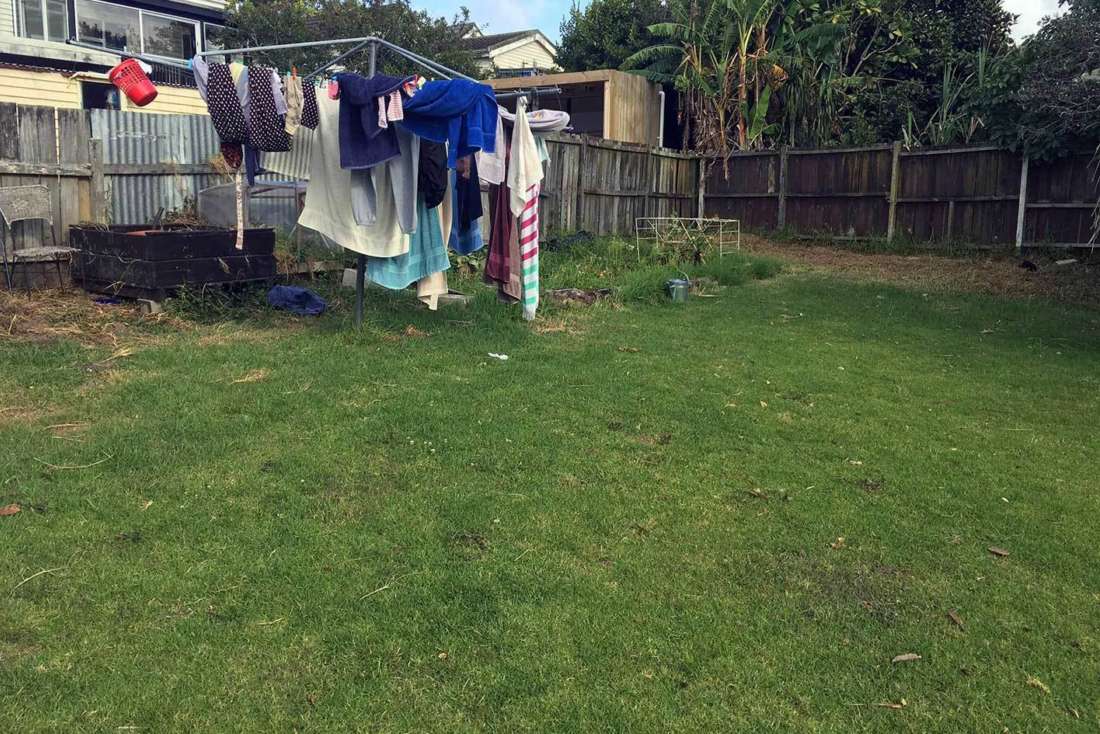
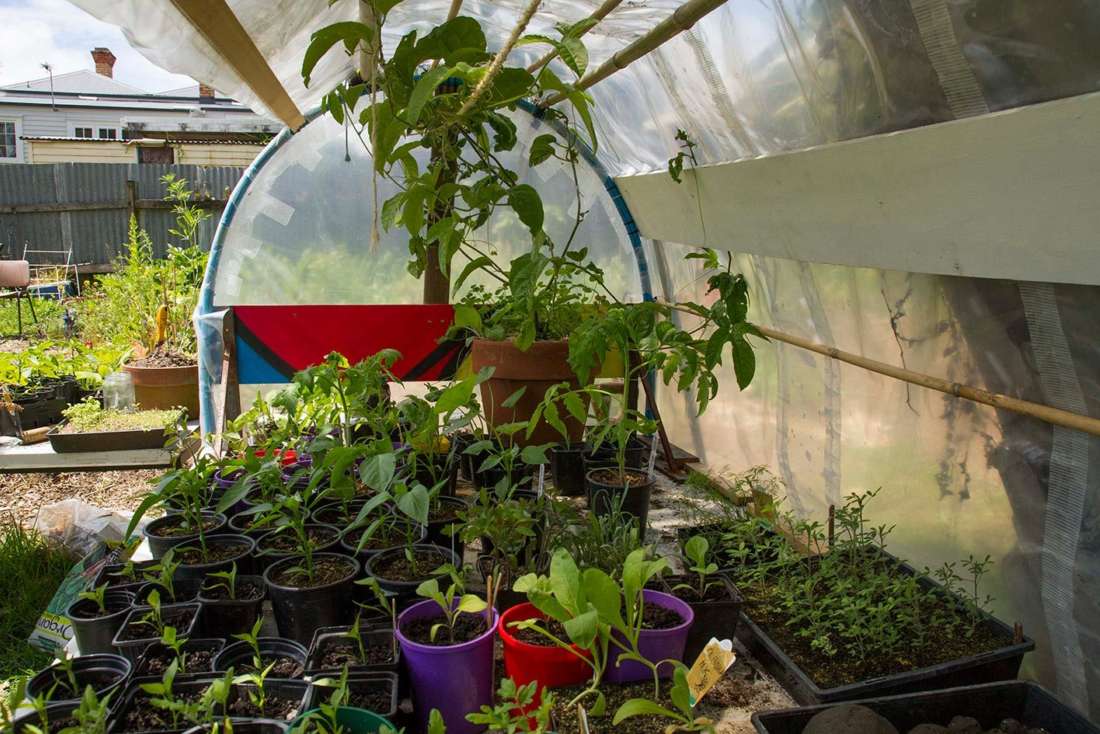
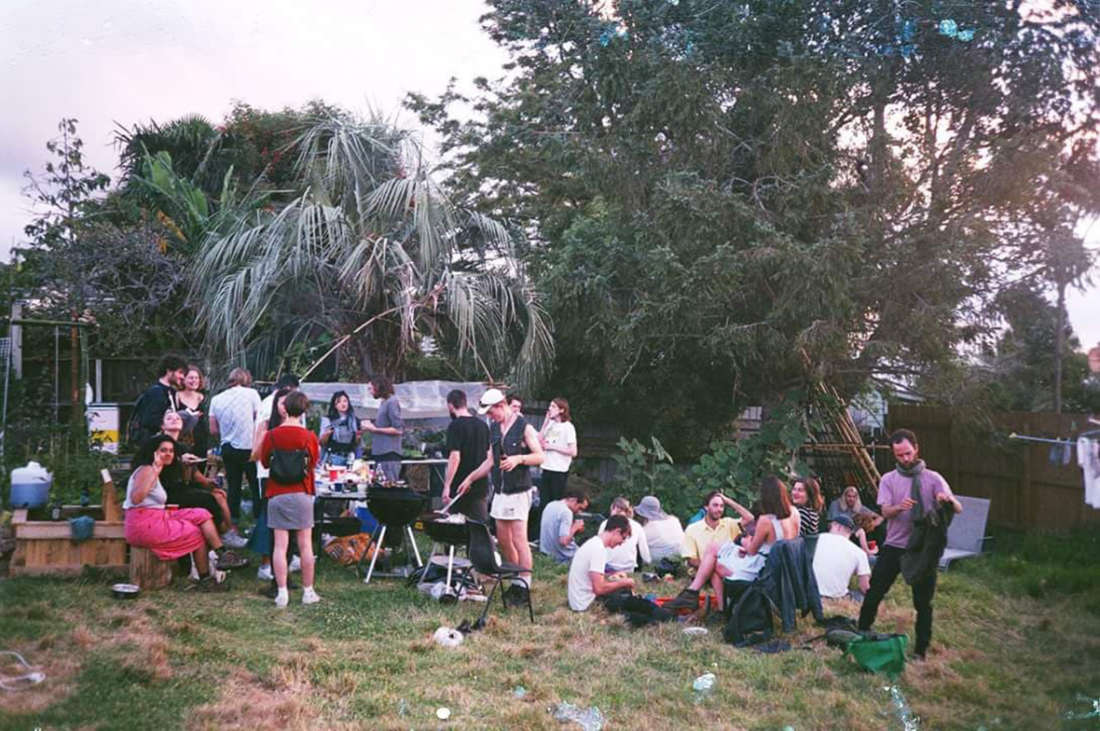
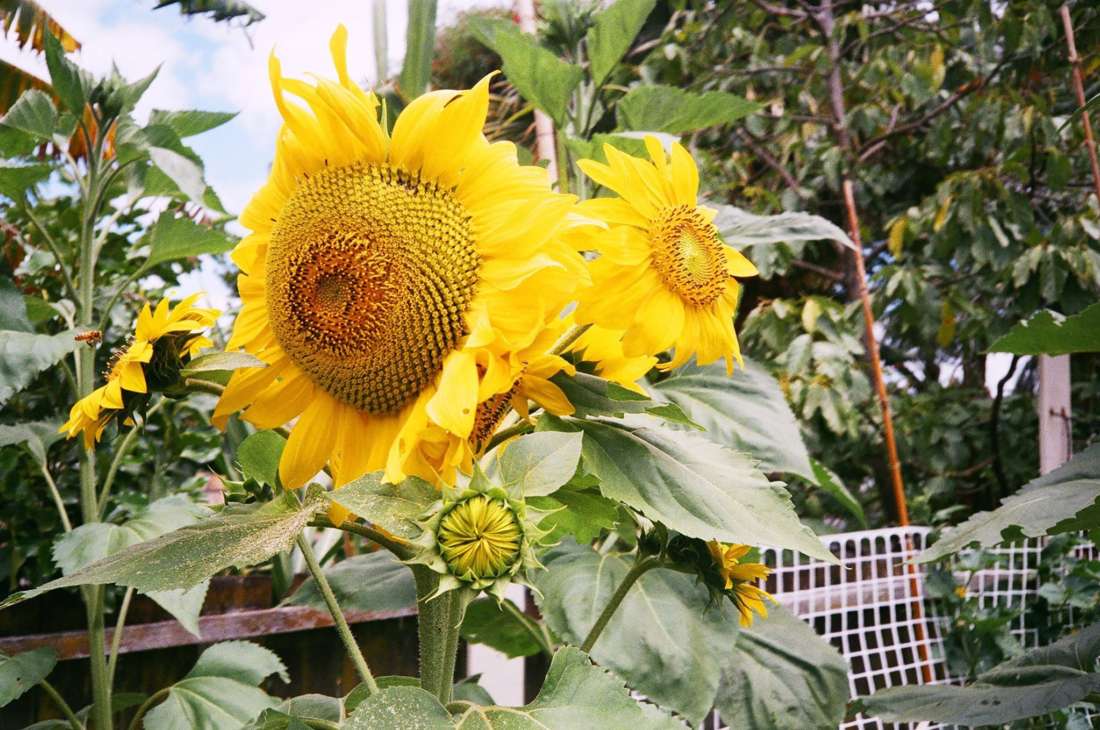
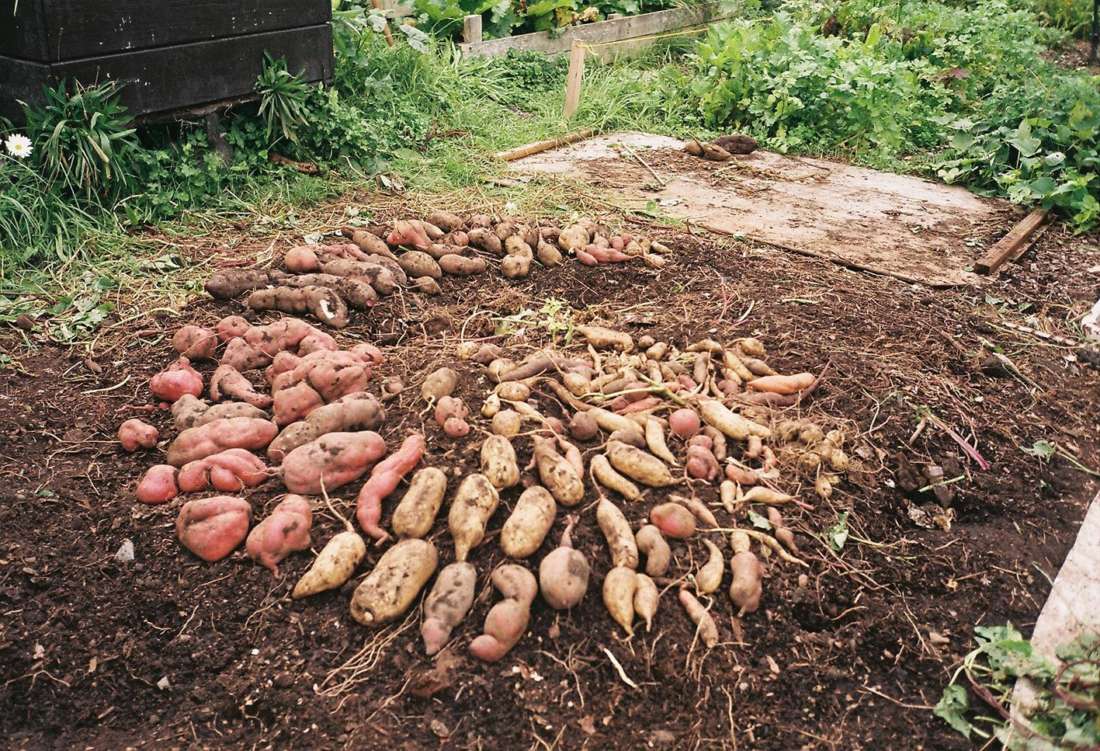
The world is a rich and beautiful place when every exchange is a gift. Aside from our honey we do not sell any excess produce from our land , instead, we gift and barter it – just as the plants do with us. We have swapped our potatoes and rhubarb for sugarcane and avocados over the neighbour’s fence. When our friends come and help us build a compost pile, or pot up a bunch of seedlings, their payment is in seedlings or food we’ve grown. The garden is a platform for sharing, a space where people collaborate and with which people interact every day. We host working bees and community barbeques where we feed friends, gift flowers, drink teas and beers and share laughs. Living off the land in such a way enables a different type of economy to flourish – a regenerative gift economy centred around community, love and abundance.
Creating a productive food garden is an immensely liberating practice, one that has led us to try new foods, experiment and share. It’s a lush lifestyle when your supermarket is in your backyard. We haven’t bought a single leafy green, salad or herb in 18 months and over the spring, summer and autumn months our food bill drops right off to $20 per week. Organic produce is expensive and inaccessible for a large portion of the population and growing your own food enables you to have power over what you eat and where it comes from. Moreover, you’re not supporting industrialised chemical-based monoculture, which is poisoning the soils of the planet and those that live on it.
We create gardens and teach biological growing not only because it’s what we love doing, but because we see it as a solution to the issues we fear- food insecurity, biodiversity loss, climate breakdown, global insect decimation. We direct the emotion we feel from the weight of these problems into creating and inspiring change. We truly believe small-scale, community-based, biological agriculture has a central role to play in the reimagining of our current world systems.
We created a garden and the community created their own.
Currently, we are part of an epic team helping to establish an urban farm and regenerative teaching hub in the middle of Auckland City called O.M.G – Organic Market Garden. Levi has been mobilising volunteers to build the garden as well as travelling around the city facilitating biological growing classes – working with community groups of all sizes, ages, ethnicities and abilities to grow food. Much of the work we do, including our garden, is directly involved with or inspired by the artwork and living sculpture For The Love of Bees – a city bee collaboration’. FTLOB seeks to create inspirational learning adventures focussed on how we can collectively imagine NZ as the safest country in the world for pollinators. It is a project that has inspired us both deeply and driven us down this path of community teaching and ecological regeneration. Ella Rose works with Gecko Trust, supporting communities to work together across the local ecological landscape to regenerate their place. Our passion is now our life and our life is now our passion.
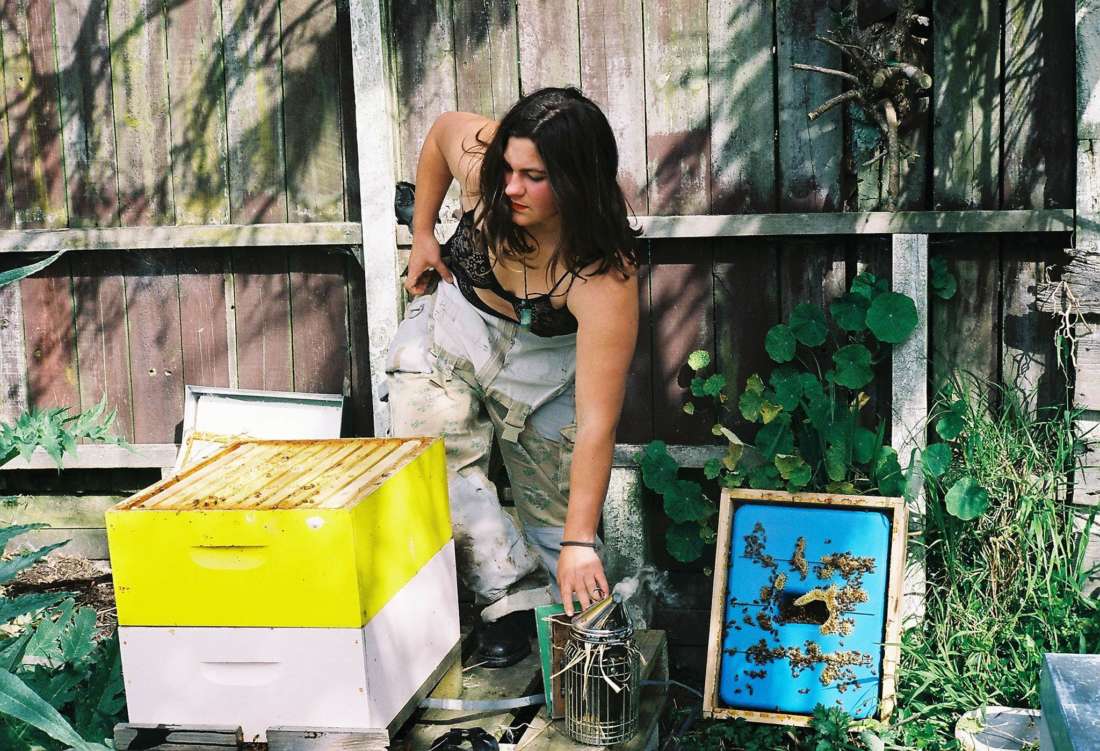
Ella Rose
I grew up in a small Scottish village of 500 people, Moniaive, meaning Hill of Streams. In Scotland ‘the right to roam’ law, gives people access rights to most land and water, both private and public. Aside from private homes, schools, fields of crops and a few other exceptions, the land is ours to roam and enjoy, camp on and care for. This right instilled in me a sense of freedom, wandering the hills, valleys and streams around my home. Equally, it embedded in me a sense of responsibility for the land. My family had a small native woodland, grew potatoes and herbs in our cottage garden and kept pigs. Foraging was simply part of rambling – the landscape fruiting brambles, sloes, raspberries, chanterelles, currants, nettles and more. We’d barter sausages for lamb, jams for chutney and often arrive home to find a pheasant or bag of apples hanging on the front door.
I left the village at 17 and moved to Madrid. Coming from the village, the newness of the city was seductive and at the same time, leaving the village was isolating. In Madrid I saw abundance amongst scarcity; plentiful food but hungry people, musicians at every corner but the silence of birds and so few trees. Like many other young people, I grew fearful for the future and developed an environmental despair. For years I saw only the problems; the waste, the inequity and the burning of our planet. It was studying permaculture design that broke this cycle of fear and enabled me to refocus on solutions. It was with dirt under my fingernails, tired arms and a belly full of fresh food that I found I had a role to play and things to do, soil and plants to grow, transcendence disguised as gardening. Growing food and regenerating ecosystems is my solace, a meditation, a means of contributing to solutions and inspiring others who feel lost like I did. I now raise gardens wherever I go, growing for biodiversity, to sequester carbon, to eat and to share. I grow to create a home and to infect the city with the values I appreciate from my village upbringing so the city may become a more communal place.
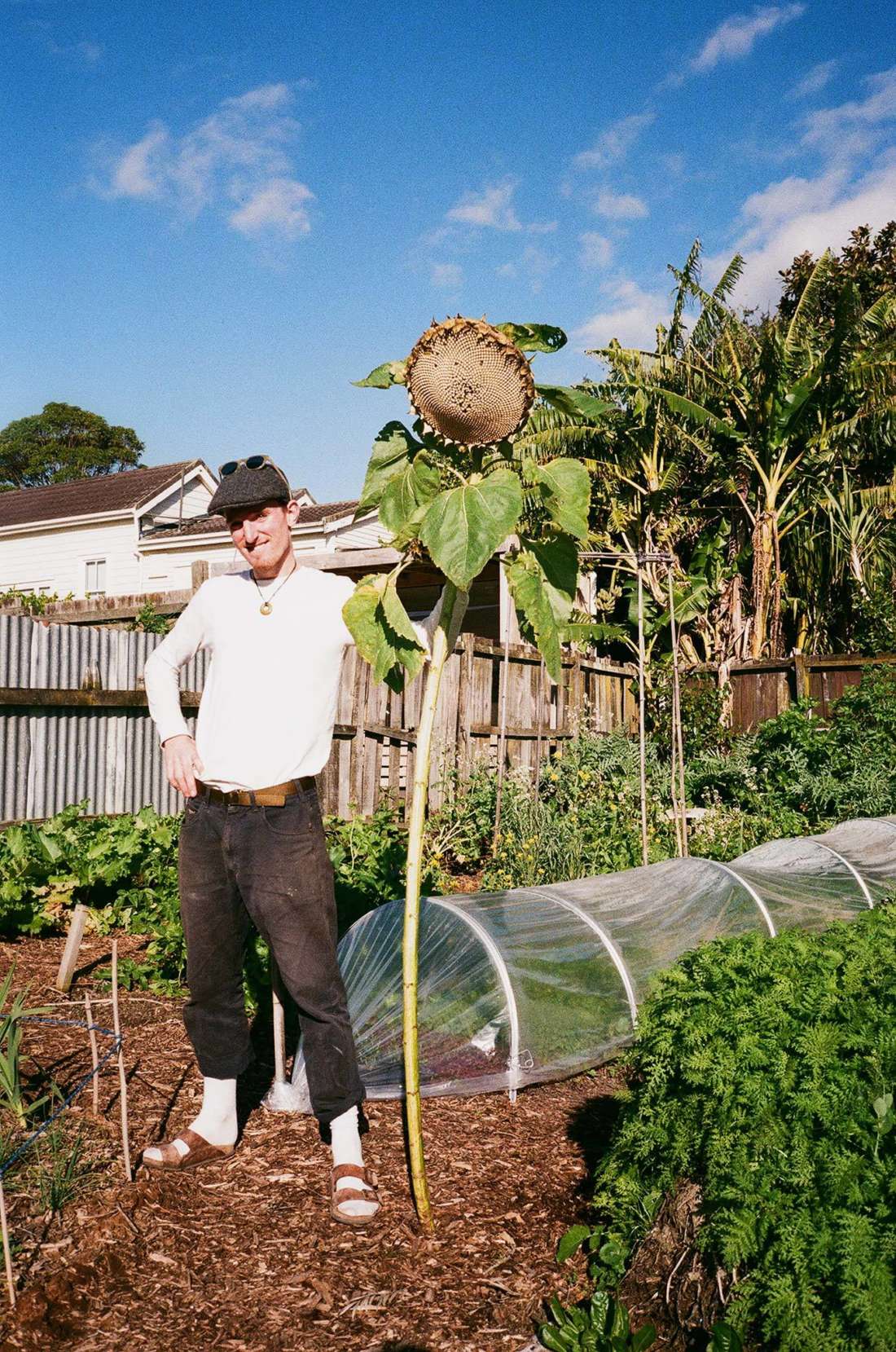
Levi
I have always been a child of obsession and deep passion. First, I was obsessed with pirates and jewels (5y/o), followed by fires and fireworks (8y/o), native bird watching (14y/o) and fishing (16y/o). I grew up in a beautiful art deco villa in central Auckland with a gorgeous garden, though my parents never properly practiced growing vegetables. It wasn’t until years later, in my final year of Elam (art school) when the stars aligned in my life and I realised the magic of seeds and the strength of nature’s life force. The first garden I ever made was catalysed through a workshop I coordinated in my final year of artschool called “being with the seed”. My friend Sarah Smuts Kennedy (now, vision holder for ‘for the love of bees – a city bee collaboration’) ran a workshop on biodynamic seed propagation, energy systems and seed politics. I took home a whole load of tomato, pumpkin, and corn seedlings and grew my first garden. My infatuation with seeds came just after I fell in love with Ella Rose who inspired and directed my passion towards growing food, soil, gardens, and community. Our relationship has flowered with the garden, learning and creating together and enjoying harvests. The garden is a reflection of us and our love.
What drove me then and now is the realisation that growing food, saving seed and caring for the land is the story of our humanity. We have been farming sustainably for millennia and foraging and hunting for all of our existence. This has been humanity’s greatest accomplishment – to grow, forage, hunt, and save enough of our own seed so that we may be well fed and nourished. I was confronted by how little I knew about this and that if the shit hit the fan in my lifetime (which it will do – according to the majority of climate change reports) it will be biological farmers that save our asses.
This journey that I have embarked on over the past 4 years, learning how to farm regeneratively and produce nutrient dense food at a large scale, is nothing new but feels incredibly special. It is a taonga we are loosing fast and I feel I am not truly ‘human’ until I have done this justice – until I have the skills to grow enough food to feed myself, my family and my community, using practices that regenerate the soil life and don’t rely on industrial / chemical inputs.
You can read more about our garden and projects or purchase some honey/candles/hard workers here:
Ella Rose Shnapp: @growsomeboobs | www.ellaroseshnapp.com | ellashnapp@gmail.com
Levi Brinsdon-Hall: @insta_abundance | www.levibrinsdonhall.com | levi.brinsdonhall@gmail.com
For the love of bees: @fortheloveofbeesnz | www.fortheloveofbees.co.nz